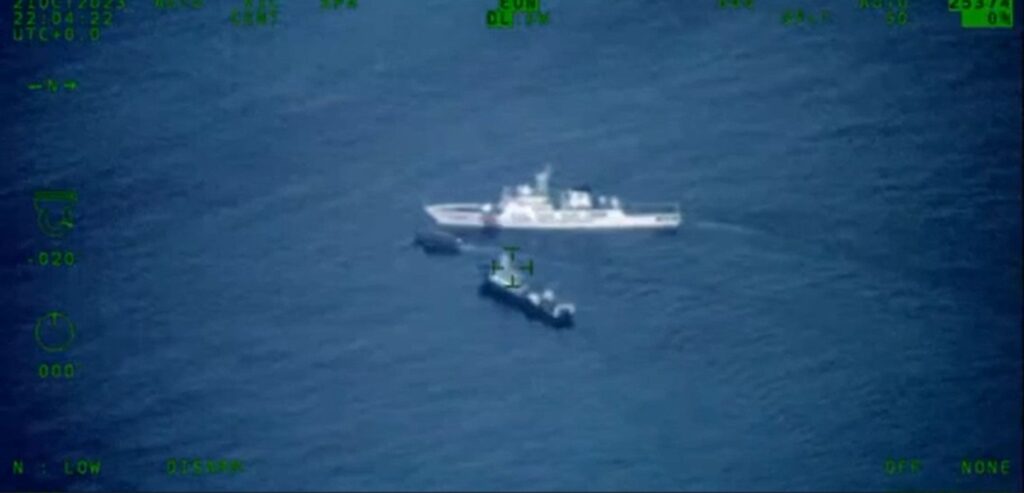Diplomacy, whole-of-gov’t approach needed to protect PH territory — Navy chief

In this screenshot of a video taken by the Armed Forces of the Philippines some 2 kilometers east of Ayungin (Second Thomas) Shoal, China Coast Guard Vessel No. 5203 blocks a boat contracted by the AFP for a resupply mission in that area of the West Philippine Sea.
The chief of the Philippine Navy said the best approach to solve the territorial conflict with China and ease the ongoing tension in the West Philippine Sea (WPS) would be through diplomatic channels.
“We believe in diplomacy and a peaceful resolution of conflict,” stressed Vice Admiral Toribio Adaci, Jr., the Navy’s incumbent Flag Officer in Command over CNN Philippines’ interview.
The Navy chief further said that a “whole-of-government approach” would be the best strategy in protecting the country’s sovereignty over its territories, especially in the WPS where China has been constantly harassing and water cannoning both Filipino fishermen and the Philippine Coast Guard.
“I always believe in inter-agency collaboration. The business of protecting the West Philippine Sea and all of our maritime environment rests not only on the military or the navy or the coast guard, but it must include all agencies of the government and even the ordinary Filipino citizens,” Adaci pointed out.
While recommending the “whole-of-government approach,” the FOIC, however, stressed the importance of pursuing the modernization of not only the Navy but the entire armed forces. He also supported calls for joint military exercises with other countries such as the United States and Japan.
“I believe in forging alliances and partnerships, especially with like-minded nations or countries that share the same maritime interests with us,” he said.
Meanwhile, retired Lt. Gen. Juancho Sabban, who once headed the AFP Western Command (WESCOM) based in Palawan, opined that oil and gas exploration should now be resumed in the WPS despite the ongoing Sino-Philippines tension in the area.
Sabban specifically mentioned the Recto Bank (International name: Reed Bank) which is believed to be rich in oil and gas deposits. A 2013 report from the United States Energy Information Administration claimed Reed Bank could hold up to 5.4 billion barrels of oil and 55.1 trillion cubic feet of natural gas.
The Bank, as upheld by the 2016 Arbitral Tribunal in its ruling in favor of the Philippines, is part of the Philippines’ Exclusive Economic Zone (EEZ) and continental shelf in the WPS where the country has exclusive sovereign rights.
“If you look at the Palawan continental shelf, it’s adjacent to Brunei and Malaysia—both of which are rich in oil. We have the same continental shelf. We learned that there is a Galoc oil field, a submarine oil field. So we need to explore more,” Sabban stressed.
The former military officer said oil and gas exploration in the area should be done by state-owned firm Philippine National Oil Company (PNOC) and other private corporations to complement the existing Malampaya gas field, which is expected to be depleted in a few years.
The Malampaya gas facility, which is located 65 kilometers off Palawan, has been the country’s source of gas since its operations commenced in the early 2000s.
“Reed Bank is a bigger Malampaya oil field that is why, I think, China is so aggressive,” Sabban said. “Reed Bank is, according to experts, 20 times more than Malampaya and it is just 30 miles from Malampaya.”
In the same TV program, Kalayaan municipal vice mayor Billy Alindogan expressed hope that the Marcos administration would make true its promise to build better infrastructure on Pag-asa Island and the other islets in the Kalayaan Island Group (KIG) to help its residents and the Filipino fisherfolks whose livelihood depends in the area.
He disclosed that the Ice Plant facility, which was recently completed through the funding from the Bureau of Fisheries and Aquatic Resources (BFAR), has yet to be fully utilized fishermen since there are not enough harvest from the sea due to the continued bullying by Chinese coast guard.
Subscribe to INQUIRER PLUS to get access to The Philippine Daily Inquirer & other 70+ titles, share up to 5 gadgets, listen to the news, download as early as 4am & share articles on social media. Call 896 6000.







